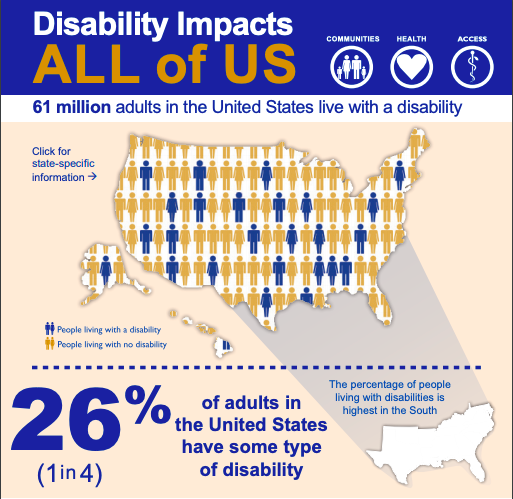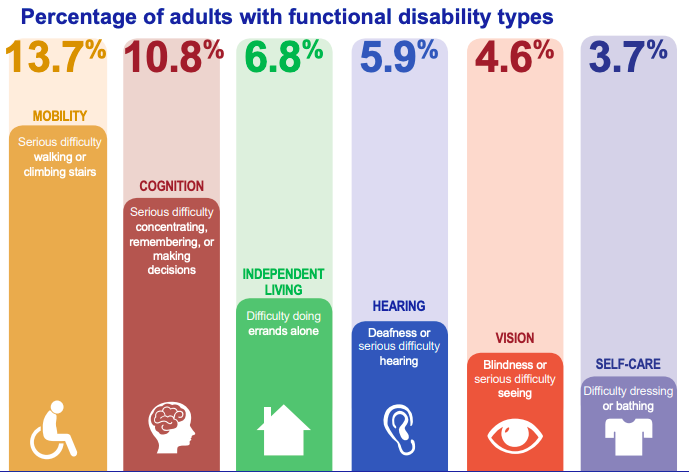Prepare a rental and commercial property for Americans with Disabilities
Over 61 million adults are dealing with disability and about 14% have challenges with mobility. As a landlord, it is important to alter your property to accommodate them.
How to prepare a rental and commercial property for Americans with Disabilities
About 26% of the American population lives with some form of disability according to the CDC. Over 61 million adults are dealing with disabilities and about 14% have challenges with mobility. As a landlord, it is important to alter your property to accommodate them – they form a significant market share. So, how to go about addressing the needs of potential renters with disabilities?
All good landlords and professional property managers must be well-versed in the laws regarding their duties towards their tenants, irrespective of their physical abilities. The Americans with Disabilities Act (ADA) outlines many laws and guidelines. With 2 in 5 senior citizens and 1 in 4 Americans with disabilities, it is high time that every landlord and property manager acquaint themselves with laws regarding housing and renting property to Americans with disabilities. See CDC charts below:


Overview of ADA and related facts
ADA stands for the Americans with Disabilities Act. It became part of the official law in the year 1990. ADA is a legal document that works to bridge gaps and remove discriminations against Americans with disabilities in all aspects of life – be it education, jobs, transportation, or renting property.
The law also discusses Housing Development Property Owners' Responsibility for Premises Liability. Since housing and rental properties are strictly covered under ADA, all landlords and property managers should know about their legal duties and responsibilities towards disabled tenants. This will help them to prevent discrimination, comply with the law, and stand out as a property manager. It will also help to avoid any unfortunate events and lawsuits.
Provide your tenants their rights under ADA
Landlords must keep in mind the legal rights of renters with a disability while entering a rental contract and ensure their property complies with the law. For example, the bathroom must at least meet the minimum required dimensions and the mirror should be hung low. Landlords should know that renters with disabilities have the right to request accommodations and an accessible unit within reason. They also have the right to file a complaint with the Housing Department.
Renters with disabilities have the right to make or ask for adjustments according to their needs in the place they are living in. However, such changes should be within reason, in accordance with the rules and regulations, and agreed upon by both the tenant and the landlord.
Special accommodations for tenants with disabilities
To grow your rental property business, make your rental and commercial property inclusive for all people. Some examples of adjustments that landlords are expected to make include:
- Delay or change in the payment schedule, if the renter relies on financial aid from the government due to their disabilities. This may include changing the payment due dates.
- Making adjustments and providing exceptions like giving such tenants the parking spot nearest to their apartment.
- As required, forego some rules normally set for other tenants. For example, you may want to inspect the property either more frequently or less so.
- Make adjustments in the property, so that the disabled tenants can live a satisfied and enjoyable life while they are renting from you.
Who pays for the special modifications?
Modifications are structural changes that the landlords make to their property to accommodate individuals with disabilities. Discuss the changes you can make within reason and means. An example of such change can be the addition of support bars in washrooms for a disabled tenant.
Mostly, the payment for any special modifications is made by the tenant. Moreover, the renter is also expected to pay the financial charges for the adjustments needed to undo any drastic modifications, if the landlord wants to remove such modifications for any future tenant that does not like these changes.
However, the exception will be when the modification requested by the disabled renter is one that should have already been made in the property in compliance with the ADA. In this scenario, all financial payments will be the responsibility of the landlord. As you make modifications to the place, keep low maintenance in mind, and select practical materials.
Preparing a rental property for Americans with disabilities
Landlords are expected to keep the following things in mind while constructing a property to rent to renters with disabilities:
- Constructing countertops that are lower in height than normal for easier access from a wheelchair. This is usually a few inches lower than the standard counter height
- Installing faucets that are specialized to require minimum effort from tenants, requiring limited hand use
- Kitchen appliances should be easy to use. It should be easily accessible by people who have poor vision or are blind
- Installing a ramp for an area at a raised height in the house such as a raised living area or at the entry of an apartment to allow wheelchairs
- The apartment complex should have accessible routes to public areas like parking lots, gym, swimming pool, etc
Preparing a commercial property for Americans with disabilities
Public property and facilities include buildings or areas that are in use of the general public. These include hotels, medical offices, cinemas, stores, theaters, sports stadiums, educational facilities, etc. Owners of such commercial properties should provide not only easy access (by installing ramps wherever needed to allow entry of wheelchairs), but also make sure that the events that take place in these areas are also easily accessible to people with disabilities.
Commercial property owners and business owners can ensure this by:
- keeping reserved tables in a restaurant that can accommodate wheelchairs
- have special seats in cinemas
- special entertainment in places like cinemas and stadiums for people who have vision and hearing disabilities, etc
Living with a disability can be limiting for many people. Limited mobility poses a challenge to everyday life. With some thought and planning, it is possible to accommodate people with disabilities. While this is a good cause, it is also good business to cater to the needs of this growing market segment. It will help landlords to keep their property rented to a long-term renter.
HomeKasa offers the best property management software in the industry. You can collect rent, communicate with the renters, manage all your properties from one place, and more. Improve your productivity with HomeKasa – get started for free now.